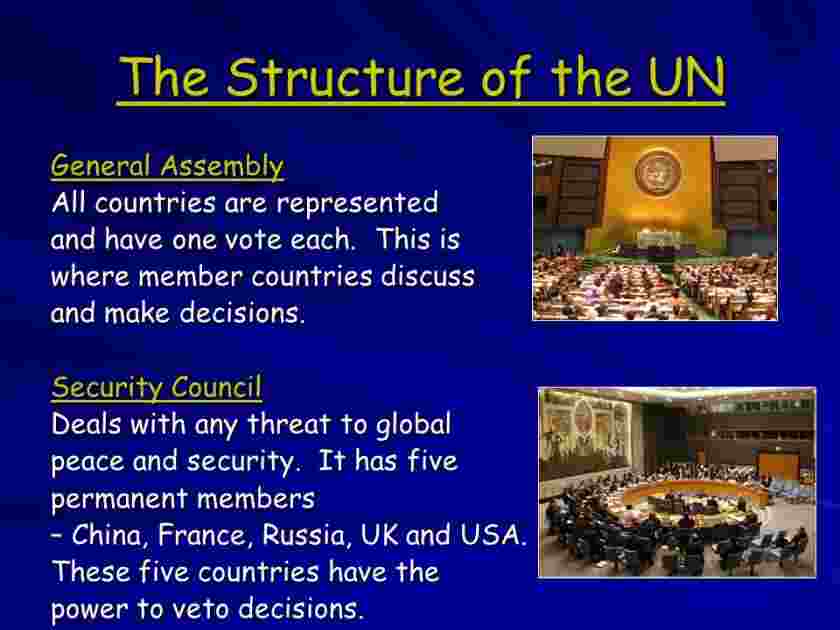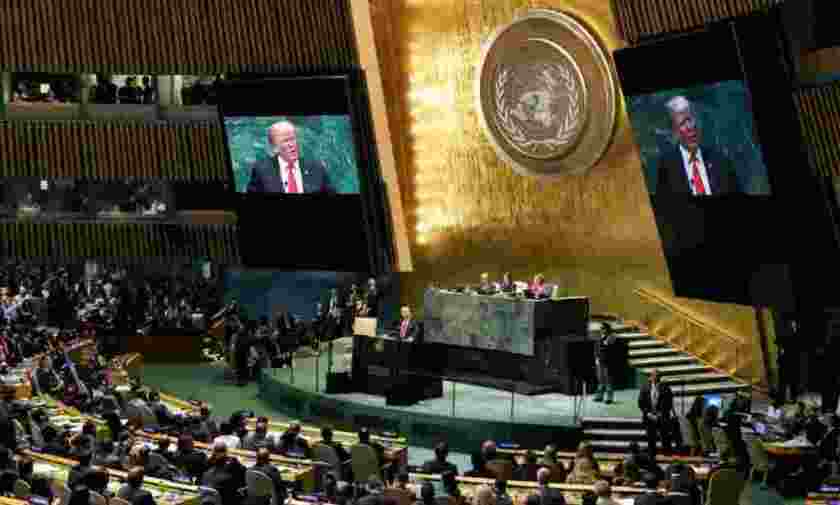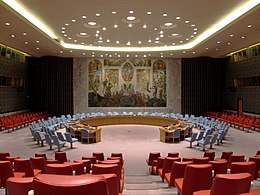ABOUT US
The United Nations (UN), is an intergovernmental organization responsible for maintaining international peace and security, developing friendly relations among nations, achieving international cooperation, and being a center for harmonizing the actions of nations.[2] It is the largest, most familiar, most internationally represented and most powerful intergovernmental organization in the world. The UN is headquartered on international territory in New York City; other main offices are in Geneva, Nairobi, Vienna and The Hague.
The UN was established after World War IIwith the aim of preventing future wars, succeeding the ineffective League of Nations.[3] On 25 April 1945, 50 governments met in San Francisco for a conference and started drafting the UN Charter, which was adopted on 25 June 1945 and took effect on 24 October 1945, when the UN began operations. Pursuant to the Charter, the organization's objectives include maintaining international peace and security, protecting human rights, delivering humanitarian aid, promoting sustainable development, and upholding international law.[4] At its founding, the UN had 51 member states; this number grew to 193 in 2011,[5] representing the vast majority of the world's sovereign states.
The organization's mission to preserve world peace was complicated in its early decades by the Cold War between the United Statesand Soviet Union and their respective allies. Its missions have consisted primarily of unarmed military observers and lightly armed troops with primarily monitoring, reporting and confidence-building roles.[6] UN membership grew significantly following widespread decolonization beginning in the 1960s. Since then, 80 former colonies have gained independence, including 11 trust territories that had been monitored by the Trusteeship Council.[7] By the 1970s, the UN's budget for economic and social development programmes far outstripped its spending on peacekeeping. After the end of the Cold War, the UN shifted and expanded its field operations, undertaking a wide variety of complex tasks.[8]
The UN has six principal organs: the General Assembly; the Security Council; the Economic and Social Council; the Trusteeship Council; the International Court of Justice; and the UN Secretariat. The UN System includes a multitude of specialized agencies, such as the World Bank Group, the World Health Organization, the World Food Programme, UNESCO, and UNICEF. Additionally, non-governmental organizations may be granted consultative status with ECOSOC and other agencies to participate in the UN's work. The UN's chief administrative officer is the Secretary-General, currently Portuguese politician and diplomat António Guterressince 1 January 2017. The organization is financed by assessed and voluntary contributions from its member states.
The UN, its officers, and its agencies have won many Nobel Peace Prizes, though other evaluations of its effectiveness have been mixed. Some commentators believe the organization to be an important force for peace and human development, while others have called it ineffective, biased, or corrupt.
The UN system is based on five principal organs: the General Assembly, the Security Council, the Economic and Social Council(ECOSOC), the International Court of Justiceand the UN Secretariat.[74] A sixth principal organ, the Trusteeship Council, suspended operations on 1 November 1994, upon the independence of Palau, the last remaining UN trustee territory.[75]
Four of the five principal organs are located at the main UN Headquarters in New York City.[76] The International Court of Justice is located in The Hague, while other major agencies are based in the UN offices at Geneva,[77] Vienna,[78] and Nairobi.[79] Other UN institutions are located throughout the world. The six official languages of the UN, used in intergovernmental meetings and documents, are Arabic, Chinese, English, French, Russian, and Spanish.[80] On the basis of the Convention on the Privileges and Immunities of the United Nations, the UN and its agencies are immune from the laws of the countries where they operate, safeguarding the UN's impartiality with regard to the host and member countries.[81]
Below the six organs sit, in the words of the author Linda Fasulo, "an amazing collection of entities and organizations, some of which are actually older than the UN itself and operate with almost complete independence from it".[82] These include specialized agencies, research and training institutions, programmes and funds, and other UN entities.[83]
The UN obeys the Noblemaire principle, which is binding on any organization that belongs to the UN system. This principle calls for salaries that will draw and keep citizens of countries where salaries are highest, and also calls for equal pay for work of equal value independent of the employee's nationality.[84][85] In practice, the ICSC takes reference to the highest-paying national civil service.[86] Staff salaries are subject to an internal tax that is administered by the UN organizations.[84][87]
General Assembly

The General Assembly is the main deliberative assembly of the UN. Composed of all UN member states, the assembly meets in regular yearly sessions, but emergency sessions can also be called.[89] The assembly is led by a president, elected from among the member states on a rotating regional basis, and 21 vice-presidents.[90] The first session convened 10 January 1946 in the Methodist Central Hall in London and included representatives of 51 nations.[28]
When the General Assembly decides on important questions such as those on peace and security, admission of new members and budgetary matters, a two-thirds majority of those present and voting is required.[91][92] All other questions are decided by a majority vote. Each member country has one vote. Apart from approval of budgetary matters, resolutions are not binding on the members. The Assembly may make recommendations on any matters within the scope of the UN, except matters of peace and security that are under consideration by the Security Council.[89]
Draft resolutions can be forwarded to the General Assembly by its six main committees:[93]
- First Committee (Disarmament and International Security)
- Second Committee (Economic and Financial)
- Third Committee (Social, Humanitarian, and Cultural)
- Fourth Committee (Special Political and Decolonization)
- Fifth Committee (Administrative and Budgetary)
- Sixth Committee (Legal)
As well as by the following two committees:
- General Committee – a supervisory committee consisting of the assembly's president, vice-president, and committee heads
- Credentials Committee – responsible for determining the credentials of each member nation's UN representatives
Security Council

The Security Council is charged with maintaining peace and security among countries. While other organs of the UN can only make "recommendations" to member states, the Security Council has the power to make binding decisions that member states have agreed to carry out, under the terms of Charter Article 25.[94] The decisions of the Council are known as United Nations Security Council resolutions.[95]
The Security Council is made up of fifteen member states, consisting of five permanent members—China, France, Russia, the United Kingdom, and the United States—and ten non-permanent members elected for two-year terms by the General Assembly (with end of term date)—Belgium (term ends 2020), Côte d'Ivoire (2019), Dominican Republic (2020), Equatorial Guinea (2019), Germany (2020), Indonesia (2020), Kuwait (2019), Peru (2019), Poland (2019), and South Africa (2020).[96]The five permanent members hold veto powerover UN resolutions, allowing a permanent member to block adoption of a resolution, though not debate. The ten temporary seats are held for two-year terms, with five member states per year voted in by the General Assembly on a regional basis.[97] The presidency of the Security Council rotates alphabetically each month.[98]
UN Secretariat

The UN Secretariat is headed by the secretary-general, assisted by the deputy secretary-general and a staff of international civil servants worldwide.[99] It provides studies, information, and facilities needed by UN bodies for their meetings. It also carries out tasks as directed by the Security Council, the General Assembly, the Economic and Social Council, and other UN bodies.[100]
The secretary-general acts as the de factospokesperson and leader of the UN. The position is defined in the UN Charter as the organization's "chief administrative officer".[101] Article 99 of the charter states that the secretary-general can bring to the Security Council's attention "any matter which in his opinion may threaten the maintenance of international peace and security", a phrase that Secretaries-General since Trygve Lie have interpreted as giving the position broad scope for action on the world stage.[102] The office has evolved into a dual role of an administrator of the UN organization and a diplomat and mediator addressing disputes between member states and finding consensus to global issues.[103]
The secretary-general is appointed by the General Assembly, after being recommended by the Security Council, where the permanent members have veto power. There are no specific criteria for the post, but over the years it has become accepted that the post shall be held for one or two terms of five years.[104] The current Secretary-General is António Guterres, who replaced Ban Ki-moonin 2017.
International Court of Justice

The International Court of Justice (ICJ), located in The Hague, in the Netherlands, is the primary judicial organ of the UN. Established in 1945 by the UN Charter, the Court began work in 1946 as the successor to the Permanent Court of International Justice. The ICJ is composed of 15 judges who serve 9-year terms and are appointed by the General Assembly; every sitting judge must be from a different nation.[106][107]
It is based in the Peace Palace in The Hague, sharing the building with the Hague Academy of International Law, a private centre for the study of international law. The ICJ's primary purpose is to adjudicate disputes among states. The court has heard cases related to war crimes, illegal state interference, ethnic cleansing, and other issues.[108] The ICJ can also be called upon by other UN organs to provide advisory opinions.[106] It is the only organ that is not located in New York.
Economic and Social Council
The Economic and Social Council (ECOSOC) assists the General Assembly in promoting international economic and social co-operation and development. ECOSOC has 54 members, which are elected by the General Assembly for a three-year term. The president is elected for a one-year term and chosen amongst the small or middle powers represented on ECOSOC. The council has one annual meeting in July, held in either New York or Geneva. Viewed as separate from the specialized bodies it co-ordinates, ECOSOC's functions include information gathering, advising member nations, and making recommendations.[109][110] Owing to its broad mandate of co-ordinating many agencies, ECOSOC has at times been criticized as unfocused or irrelevant.[109][111]
ECOSOC's subsidiary bodies include the United Nations Permanent Forum on Indigenous Issues, which advises UN agencies on issues relating to indigenous peoples; the United Nations Forum on Forests, which co-ordinates and promotes sustainable forest management; the United Nations Statistical Commission, which co-ordinates information-gathering efforts between agencies; and the Commission on Sustainable Development, which co-ordinates efforts between UN agencies and NGOs working towards sustainable development. ECOSOC may also grant consultative status to non-governmental organizations;[109] by 2004, more than 2,200 organizations had received this status.[112]
Specialized agencies
The UN Charter stipulates that each primary organ of the United Nations can establish various specialized agencies to fulfil its duties.[113] Some best-known agencies are the International Atomic Energy Agency, the Food and Agriculture Organization, UNESCO (United Nations Educational, Scientific and Cultural Organization), the World Bank, and the World Health Organization (WHO). The UN performs most of its humanitarian work through these agencies. Examples include mass vaccination programmes (through WHO), the avoidance of famine and malnutrition (through the work of the WFP), and the protection of vulnerable and displaced people (for example, by UNHCR).[114]











Leave a Message